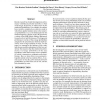Free Online Productivity Tools
i2Speak
i2Symbol
i2OCR
iTex2Img
iWeb2Print
iWeb2Shot
i2Type
iPdf2Split
iPdf2Merge
i2Bopomofo
i2Arabic
i2Style
i2Image
i2PDF
iLatex2Rtf
Sci2ools
UAI
1996
1996
Why is diagnosis using belief networks insensitive to imprecision in probabilities?
Recent research has found that diagnostic performance with Bayesian belief networks is often surprisingly insensitive to imprecision in the numerical probabilities. For example, the authors have recently completed an extensive study in which they applied random noise to the numerical probabilities in a set of belief networks for medical diagnosis, subsets of the CPCS network, a subset of the QMR (Quick Medical Reference) focused on liver and bile diseases. The diagnostic performance in terms of the average probabilities assigned to the actual diseases showed small sensitivity even to large amounts of noise. In this paper, we summarize the findings of this study and discuss possible explanations of this low sensitivity. One reason is that the criterion for performance is average probability of the true hypotheses, rather than average error in probability, which is insensitive to symmetric noise distributions. But, we show that even asymmetric, logodds-normal noise has modest effects. A...
| Added | 02 Nov 2010 |
| Updated | 02 Nov 2010 |
| Type | Conference |
| Year | 1996 |
| Where | UAI |
| Authors | Max Henrion, Malcolm Pradhan, Brendan Del Favero, Kurt Huang, Gregory M. Provan, Paul O'Rorke |
Comments (0)

